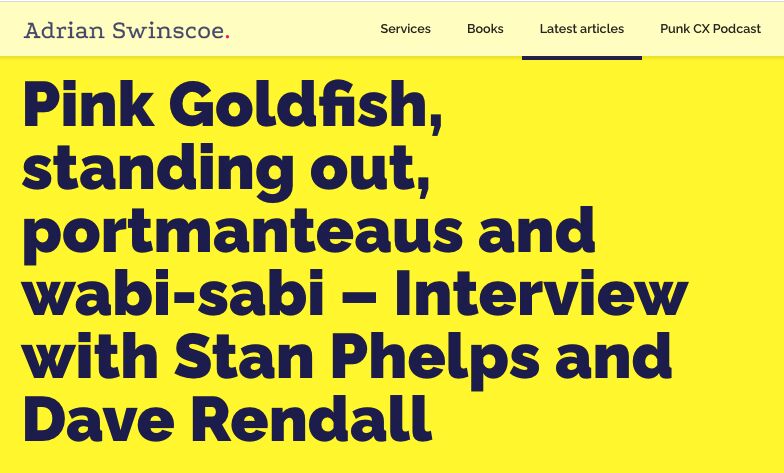David Rendall and I talk with Adrian Swinscoe on the Punk CX podcast about “Pink Goldfish 2.0: Defy Normal and Exploit Imperfection.” (Here’s the link to Episode 399)
Main Takeaway: We discuss how to make our imperfections work for us and help us stand out and differentiate in business.
Here are some of the highlights of our conversation:
– The world conspires to tell us that we need to be more perfect and more well balanced and well rounded and we need to hide and fix our flaws. But, that’s not true. We should be flaunting our flaws instead of benchmarking against “normal.”
– The number of companies that achieve competitive separation is depressingly small.
– Wabi-sabi, a Japanese term, is the idea that nature is beautiful, but nature is imperfect and its imperfection is the thing that makes it beautiful.
– The book uses a portmanteau “flawsome,” a combination of flawed and awesome, which it turns into an acronym: F.L.A.W.S.O.M.E.
– Each letter in flawsome stands for a different type of Pink Goldfish that you can leverage to your advantage: Flaunting, Lopsiding, Antagonizing, Withholding, Swerving, Opposing, Micro-Weirding, and Exposing.
– Flaunting is not about fixing a flaw, it’s about being unapologetic. Being so proud of it that you can actually brag about it.
– The book goes into detail for each one and provides lots of stories and examples to bring all of these to life.
– We talk about the power of bad reviews. Amber Share found that every national park in the United States has, at least, one 1-star review and she creates beautiful art with them. For example, one visitor to the Grand Canyon gave it a 1-star review and wrote: “A HOLE. A VERY, VERY LARGE HOLE.”
– Only 3% of individuals or businesses have the ability to become extra ordinary or extraordinary. The remaining 97% are constrained by the “norms” of their industry.
– Your weakness is already a strength. You’re just not seeing it that way. And, you’re also not seeing that a strength of a competitor is a weakness.
– Adrian shared two great Pink Goldfish examples: Stella Artois: Reassuringly expensive and Guinness: Good things come to those who wait.
Background: The podcast Punk CX takes its title by the book of the same name by Adrian Swinscoe. It was inspired by the emergence of punk music. Punk was in stark contrast to the progressive-rock era of the 1970s. Punk music became a statement to go against the norm. The creators of punk saw “prog rock” as becoming too measured and overly technical. Adrian describes this mindset by stating, “It was a very DIY, democratic, back-to-basics approach. It was more about mindset and daring to be different and being okay that not everybody would like it.” Adrian sees an analogy to how most companies approach customer experience. Companies should drop the technicalities and start committing to action-based solutions.
Follow me on Twitter or LinkedIn.

Stan Phelps walks the walk. He stands out in the sea of sameness by modeling his own Differentiated Experience (DX) message: Differentiation isn’t just about what you say, it’s about what you do and, more importantly, how and why you do it. Stan leverages his unique collection of 5,000+ case studies on customer, employee, and brand experience to engage audiences with informative learning-based experiences. He believes purposeful DX wins the hearts of employees and customers, and differentiation ultimately boosts loyalty, retention, referrals, and results.
Find Stan’s in-person and virtual keynotes, workshops, and Goldfish tank programs at StanPhelps.com.

